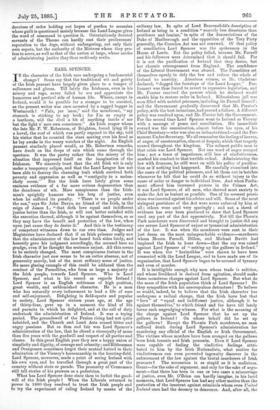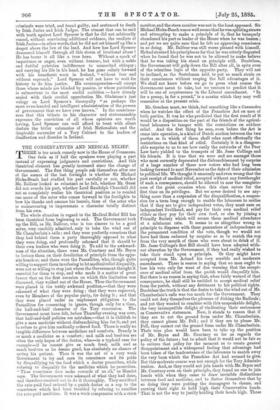EARL SPENCER.
TS the character of the Irish race undergoing a fundamental
change ? Some say that the traditional wit and gaiety of the Irish peasant have largely given place to a temper of sullenness and gloom. Till lately the Irishman, even in his misery and rags, never failed to see and appreciate the humorous and poetical side of human life. Where, except in Ireland, would it be possible for a stranger to be accosted, as the present writer was once accosted by a ragged beggar in Westmeath ? "Fair, yer 'anur," said the mendicant, "my stomach is sticking to my back ; for I'm as empty as a lanthorn, wid the divil a bit of anything inside o' me but the light o' mee own conscience." An Irish reaper whom the late Mr. F. W. Robertson, of Brighton, found lying ill in a hovel, the roof of which was partly exposed to the sky, told his visitor that he counted the stars moving over his head as he lay awake in the weary watches of the night. An English peasant similarly placed would, as Mr. Robertson remarks, have dwelt on the drops of rain which came through the aperture. It was the poetry rather than the misery of the situation that impressed itself on the imagination of the Irishman. We sincerely trust that the old Irish wit is only under a temporary eclipse, and that the Land League has not been able to destroy the charming trait which survived both poverty and oppression as well as "contiguity to a melan- choly ocean." But the Irish have lately given some ominous evidence of a far more serious degeneration than the decadence of wit. More conspicuous than the Irish- man's sprightly humour was his love of justice, even when he suffered its penalty. "There is no people under the sun," says Sir John Davys, no friend of the Irish, in'the reign of James I., "that doth love equal and indifferent justice better than the Irish, or will rest better satisfied with the execution thereof, although it be against themselves, so as they may have the benefit and protection of the law, when upon just cause they do desire it." And this is the testimony of competent witnesses down to our own time. Judges and Magistrates have declared that if an Irish prisoner really saw that the administrator of the law heard both sides fairly, and honestly gave his judgment accordingly, the accused bore no grudge, even if he thought the sentence unjust. All this seems to be entirely changed. The most conspicuous feature in the Irish character just now seems to be an entire absence, not of generosity merely, but of the most ordinary sense of justice. No more glaring example of this could be adduced than the conduct of the Parnellites, who form so large a majority of the Irish people, towards Lord Spencer. Who is Lord Spencer, and what is his record as regards Ireland.? Lord Spencer is an English nobleman of high position, great wealth, and unblemished character. He is a man who has naturally every inducement to lead a life of ease and self-enjoyment. Delighting in field-sports and popular in society, Lord Spencer sixteen years ago, at the age of thirty-four, gave up in a moment the kind of life and pursuits in which he delighted, and at the call of duty undertook the administration of Ireland. It was a trying period. The groundswell of the Fenian rising had not quite subsided, and the Church and Land Acts roused bitter and angry passions. But so firm and fair was Lord Spencer's administration of the law, that he closed a viceroyalty of more than five years with the goodwill and respect of all parties and classes. In this great English peer they saw a happy union of simplicity and dignity, of courage and urbanity; and Ribbonmen and Orangemen sometimes forgot their mutual hatred in their admiration of the Viceroy's horsemanship in the hunting-field. Lord Spencer, moreover, made a point of seeing Ireland with his own eyes, and he travelled through a great part of the country without state or parade. The peasantry of Connemara still tell stories of his prowess as a pedestrian.
What has Lord Spencer done since then to forfeit the good- will of the Irish people ? When the Liberals returned to power in 1880 they resolved to trust the Irish people and to try the experiment of ruling Ireland by means of the 1
ordinary law. In spite of Lord Beaconsfield's description of Ireland as being in a condition "scarcely less disastrous than pestilence and famine," in spite of the denunciations of the Duke of Marlborough and the opposition of the Tory Party generally, the Coercion Act was not renewed. Of that policy of conciliation Lord Spencer was the spokesman in the House of Lords. But the policy failed, because Mr. Parnell and his followers were determined that it should fail. For it is not the pacification of Ireland that they desire, but her chronic estrangement from England. The confidence of the Liberal Government was abused. The Parnellites set themselves openly to defy the law and reduce the whole of Ireland to anarchy. Atrocious crimes, as Mr. Gladstone declared, "dogged the footsteps of the Land League." Par- liament Was thus forced to revert to repressive legislation, and Mr. Forster received the powers which he declared would enable him to restore order in Ireland. Kilmainham jail was soon filled with untried prisoners, including Mr. Parnell himself; and the Government gradually discovered that Mr. Forster's policy, with the best intentions, had proved a failure. A different policy was resolved upon, and Mr. Forster left the Government. For the second time Lord Spencer went to Ireland as Viceroy with a message of peace and conciliation. His immediate reward was the assassination, almost before his eyes, of his Chief Secretary—who was also an intimatefriend—and the Per- manent Under-Secretary. We all remember the feeling of horror, of anger, of consternation, almost of despair, which that tragedy caused throughout the kingdom. The calmest public man in that crisis was Lord Spencer. Not one word of anger escaped him ; not a trace of impatience, still less of vindictiveness, marked his conduct in that terrible ordeal. Administering the law with firmness, he still went on with his policy of pacifica- tion as if nothing had happened. He carefully examined into the eases of the political prisoners, and let them out in batches whenever he felt that he could do so without injury to the cause of order or danger to individual lives. And when Parlia- ment offered him increased powers in the Crimes Act, it was Lord Spencer, of all men, who showed most anxiety to make the Act as lenient as possible. One of its severest provi- sions was inserted against his advice and will. Some of the most stringent provisions of the Act were never enforced by him at all ; others were used very sparingly ; and not a shred of evidence has ever been produced to show that Lord Spencer used any part of the Act oppressively. Not till the Phcenix Park murderers were discovered and brought to justice did any one accuse Lord Spencer of unjust or tyrannical administration of the law. It was when the murderers were sent to their just doom on the most unimpeachable evidence—murderers whom Messrs. Parnell, Dillon, and Michael Davitt had implored the Irish to hunt down—that the cry was raised against Lord Spencer of 'setting up the gallows in Ireland." It was when the " Invincibles " were shown to have been connected with the Land League, and to have made use of its organisation, that Lord Spencer began to be accused of tyranny and even of murder.
It is intelligible enough why men whose trade is sedition, and whose livelihood is derived from agitation, should make these monstrous charges against Lord Spencer. But what do the mass of the Irish population think of Lord Spencer? Do they sympathise with his unscrupulous detractors ? To believe so would, indeed, be to believe that the Irish character has undergone a: radical change, that the Irish have lost that " love " of "equal and indifferent justice, although it be against themselves," to which friend and foe have till lately borne such ungrudging witness. For what is the meaning of the charge against Lord Spencer that he set up the gallows in Ireland ? On whose behalf did he set up the gallows ? Except the Phcenix Park murderers, no man suffered death during Lord Spencer's administration for murdering any official of the English or Irish Government. The victims whose murders have been avenged on the gallows were Irish tenants and Irish peasants. Even if Lord Spencer were capable of feeling the vindictive feelings attri- buted to him by the Irish Nationalists, what motive for vindictiveness can even perverted ingenuity discover in the enforcement of the law against the brutal murderers of Irish peasants ? The accusation is as stupid as it is malicious. Grant—for the sake of argument, and only for the sake of argu- ment—that there has been in one or two cases a miscarriage of justice, even Mr. O'Brien can hardly imagine, in his lucid moments, that Lord Spencer has had any other motive than the protection of the innocent against criminals whom even United Ireland once had the decency to denounce. And, after all, the criminals were tried, and found guilty, and sentenced to death by Irish Juries and Irish Judges. The utmost that can be said with truth against Lord Spencer is that he did not arbitrarily cancel, without convincing additional evidence, the verdicts of Irish Juries—in other words, that he did not set himself up like a despot above the law of the land. And how has Lord Spencer demeaned himself through all this storm of irrational abuse ? He has borne it all like a true hero. Without a spark of impatience or anger, even without hauteur, but with a noble and dutiful patrician indifference to unmerited obloquy ; and carrying his life in his hand, he has gone calmly forward with his beneficent work in Ireland, "without fear and without reproach." Lord Spencer will not have to wait for history to do him justice. His contemporaries—all except those whose minds are blinded by passion, or whose patriotism is subservient to the most sordid ambition — have already sealed with their cordial approbation Mr. Gladstone's just eulogy on Lord Spencer's viceroyalty "as perhaps the most even-handed and intelligent administration of the powers of government that we have ever known." In the conscious- ness that this tribute to his character and statesmanship expresses the conviction of all whose opinions are worth having, Lord Spencer can well afford to treat with silent disdain the bitter calumnies of Irish Nationalists and the despicable surrender of a Tory Cabinet to the leaders of disaffection and disorder in Ireland.



































 Previous page
Previous page